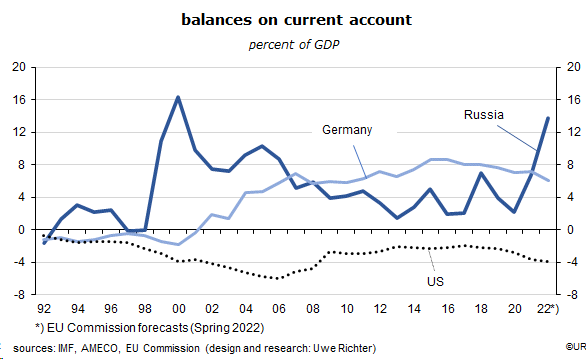
Market Commentary: Rebuilding Ukraine – forcing Russia to pay for it
Dieter Wermuth, Economist and Partner at Wermuth Asset Management
There is a discussion these days about the likely cost of reconstructing Ukraine’s infrastructure and housing stock once the war is over. Estimates vary widely, with a maximum of up to 1,000 billion euros. This is significantly more than the country’s pre-war GDP (2021: 168 billion euros) but will of course not be spent all at once.
In a fair world, Russia would have to pick up the bill because it has started the invasion for no plausible reason and without being provoked. It is responsible for the destruction and for thousands of civilian and military casualties. Since Russia cannot be defeated by Ukraine, it will refuse to pay for the damage, at least for the moment.
From a financial point of view, this would actually be no problem at all because Russia’s net foreign assets are very large and have also increased a lot since last year’s take-off of global energy prices and the economic sanctions imposed by the West over the past three months – which have led to a decline of Russian imports. In its spring forecast, the EU Commission has forecast that Russia’s 2022 balance on current account will show a surplus of no less than 13.7% of its nominal GDP. The surplus is the equivalent of an increase in its net foreign assets. Almost no other country holds, relative to its GDP, so much foreign wealth. Almost no other country exports so much capital, lives so far below its means, and has so many reserves.

If the economic sanctions against Russia and its governing class can be maintained for a few more quarters, and if everybody in the West fully sticks to what has been agreed, it may be possible to force Russia to pay up after all. We are dealing with a small and poor commodity economy which depends much more on the West than vice versa. NATO’s GDP is about 25 times larger than that of Russia, while the EU on its own is nine times bigger. No one needs to be afraid that a cut-off of Russian oil and gas supplies would be a catastrophe: the world energy market is large, flexible and full of alternatives.
Should there be an all-out arms race once again, there is no doubt who is going to win. For Russia it would mean a dramatic and politically risky reduction of its standard of living which, at a third of EU levels on the basis of GDP per capita, is very low already – and unevenly distributed. Things are already deteriorating very fast. The EU Commission predicts that Russia’s real GDP will be 10.5% lower this year than in 2021 while consumer prices will be up more than 20%. It starts to hurt.
In the end, Russia will probably be forced to make more concessions than it presently seems to expect. In all likelihood these include the full troop withdrawal from Ukraine as well as reparations for war damages. Russia’s foreign assets are de facto under the control of the West and can be frozen anytime. The longer the war lasts the more will sanctions bite. Sadly, this means yet more destruction and thousands of more deaths, before it is all over.
###
For more information please contact:
Instinctif Partners // Lars Hofer
E lars.hofer@instinctif.com
T +49 162 562 8917
Visit us: https://wermutham.com/
Follow us on Twitter and LinkedIn
About Wermuth Asset Management
Wermuth Asset Management (WAM) is a Family Office which also acts as a BAFIN-regulated investment consultant.
The company specializes in climate impact investments across all asset classes, with a focus on EU “exponential organizations” as defined by Singularity University, i.e., companies which solve a major problem of humanity profitably and can grow exponentially. Through private equity, listed assets, infrastructure and real assets, the company invests through its own funds and third-party funds. WAM adheres to the UN Principles of Responsible Investing (UNPRI) and UN Compact and is a member of the Institutional Investor Group on Climate Change (IIGCC), the Global Impact Investing Network (GIIN) and the Divest-Invest Movement.
Jochen Wermuth founded WAM in 1999. He is a German climate impact investor who served on the steering committee of “Europeans for Divest Invest”. As of June 2017, he was also a member of the investment strategy committee for the EUR 24 billion German Sovereign Wealth Fund (KENFO).
Legal Disclaimer
The information contained in this document is for informational purposes only and does not constitute investment advice. The opinions and valuations contained in this document are subject to change and reflect the viewpoint of Wermuth Asset Management in the current economic environment. No liability is assumed for the accuracy and completeness of the information. Past performance is not a reliable indication of current or future developments. The financial instruments mentioned are for illustrative purposes only and should not be construed as a direct offer or investment recommendation or advice. The securities listed have been selected from the universe of securities covered by the portfolio managers to assist the reader in better understanding the issues presented and do not necessarily form part of any portfolio or constitute recommendations by the portfolio managers. There is no guarantee that forecasts will occur.
Read the full article in PDF format here: English. / Deutsch.